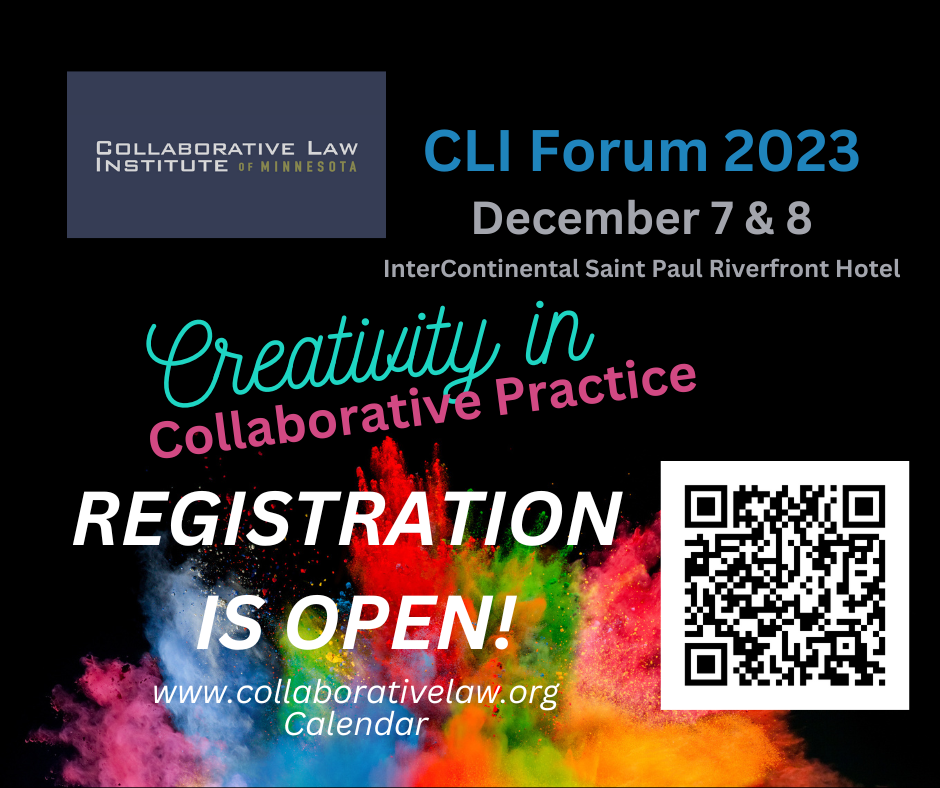The CLI MN East Metro Group invites you to join their Happy Hour on Thursday June 13 from 4 – 6:30 pm
I have a prediction: In the next twenty years, Collaborative Divorce will become the standard for divorce process in Minnesota.
In my nine years as a family law attorney, the majority of my cases have been “traditional” in nature. Traditional in this sense means that the process of divorce starts with a petitioner spouse who serves a summons and petition upon the respondent spouse. The divorce is either settled along the way or it is litigated all the way to trial. Sprinkled in for the past five years have been Collaborative Divorce cases, in which both spouses choose to work with a Collaboratively trained team (comprised of two attorneys and sometimes a neutral child or financial specialist) and to resolve their divorce in an out-of-court setting. Both processes end with a divorce, but one often results in collateral damage resulting from unchecked animosity and litigation, often referred to as the “scorched earth” approach.
Most family law attorneys with whom I have spoken really dislike these scorched earth cases. Some attorneys are complicit in these cases for myriad reasons. These difficult cases, which take place with heavy court involvement, place a tremendous burden on families, on attorneys, and on the courts. Every case that is filed (and that is not In Forma Pauperis) requires the same filing fee to pay for case oversight. Some cases require only that a judge reviews and signs the final divorce decree, while others languish in courts for years, as court staff oversees countless motions, counter-motions, requests for phone calls, letter submissions, etc.
Many family law practitioners grow weary of endless divorce litigation. Of unpleasant and over-aggressive attorneys (we all have our own “no-fly” list). Of client despair (“So you’re telling me I might as well give up?!”). Of not being paid. This work is emotionally taxing. There is seldom follow-up with clients after a case concludes, even those whom we genuinely like. After all, who wants to hear from the one person most closely related to the end of their marriage (aside from their ex) after the waters calm? Who among us has ever felt concerned about personal safety after working a particularly difficult case involving one party with anger management problems (and possibly an affinity for firearms?)
Yet family law practice has its rewards. Family attorneys have unique skills: we are insightful and often empathetic. We excel at interpersonal communication. We are problem solvers. At our best, we are a helping profession: acting as a guide to clients who are in the dark and often feeling very vulnerable. It is an honor to help our clients through family-related legal problems. The best way to serve our clients is by helping them to preserve their dignity and to make decisions in a way that will not cause them to feel shame or regret years after their matter is concluded. While it is not impossible to have a good family law matter in a traditional context, it is never a guarantee. Cases that start out smoothly can easily become derailed by one misstep: an e-mail that struck the wrong tone (often unintentionally). A poorly timed request. A genuine misunderstanding of intention. I myself am guilty of misunderstanding and missteps.
I have known many family law attorneys who either stopped practicing law entirely or pivoted to another practice area mid-career. Something obviously needs to change and I believe a sea change is indeed coming. I sense that the tide is turning in favor of extended ADR and Collaborative Divorce instead of the nuclear approach that takes a pound flesh from all involved (especially the poor children in these scorched earth cases).
As our Collaborative community continues to grow, I am seeing more and more thoughtful practitioners and many younger attorneys attracted to this process that asks everyone to show up in good faith: attorneys, neutrals, and clients alike. Some matters should not be routed into the Collaborative model. Obvious exceptions from Collaborative practice include matters involving domestic violence, coercive control, and unacknowledged addictions. Most families, however, would benefit from the approach that creates a space for active listening, understanding, and slowing down when needed.
If you are reading this and you find yourself battle-fatigued from traditional family law practice or if you are curious about Collaborative practice, I hope you will take some time to reach out and learn about this unique and wonderful multi-disciplinary community of professionals committed to serving families with excellence and integrity.
I hope to still be practicing family law in 20 years; if I am, I know it will be because I have pared down my traditional family law practice considerably and have prioritized Collaborative practice and other forms of ADR. I will revisit this blog entry and muse on the state of family law practice in Minnesota in 2043, I am certain, with gratitude and hope for families in Minnesota.
Rebecca Randen is a family law attorney and mediator. She practices Collaborative and traditional family law and is based out of Edina, Minnesota. Rebecca speaks Spanish and has represented many Spanish-speaking clients. Rebecca is serving her third year on the CLI Board of Directors and is serving as Board President through the end of 2023.

Rebecca Randen is a family law attorney and mediator. She practices Collaborative and traditional family law and is based out of Edina, Minnesota. Rebecca speaks Spanish and has represented many Spanish-speaking clients. Rebecca is serving her third year on the CLI Board of Directors and is serving as Board President through the end of 2023.
Attorney/Mediator
Randen, Chakirov & Grotkin LLC
rebecca@rcglawoffice.com | rcglawoffice.com
Every December our Collaborative community has a wonderful opportunity to gather for our Annual Forum.
The Forum is a time and place to connect with colleagues, become informed and educated about important professional topics, regenerate our passion and enthusiasm for our Collaborative work, and have fun!
You won’t want to miss this opportunity. We so look forward to seeing you and hope you will join us!
Event Details:
What: CLI Minnesota Forum 2023
Theme: Creativity in Collaborative Practice
Dates & Times:
Thursday, December 7, 2023
8:30 AM – 4:15 PM Educational sessions, time with exhibitors
3:15 PM Special Breakout session for students and non-member professionals to learn more about Collaborative Practice.
4:15 PM Happy Hour
6:00 PM Dinner
7:30 PM AJW Fun Factor
Friday, December 8, 2023
8:30 AM – 12:00 PM Annual Meeting, educational sessions
Full Agenda: Click here
Location: InterContinental Saint Paul Riverfront Hotel |11Kellogg Blvd. East, Saint Paul, MN 55101
Menu:
BREAKFAST BOTH DAYS: Continental
LUNCH THURSDAY: Sandwich Shop Buffet:
DESSERT BUFFET: Cookies and bars
HAPPY HOUR APPETIZERS and CASH BAR
DINNER: Baby Beet and Arugula Salad with Candied Walnuts: Creamy Goat Cheese, Citrus, Orange-Vanilla Vinaigrette.
Choice of:
Sautéed Salmon | Paella Rice, Meyer Lemon Sabayon
Seared Chicken | Natural Pan Sauce, Smoked Gouda Mashed Potato
Butternut Squash Ravioli | Mascarpone Sage Cream Sauce, Sauteed Spinach, Balsamic Reduction
Dessert: Lemon Tart
Cost:
CLI members must login to their online account to receive member pricing.
ALL PACKAGES WITH HOTEL ROOMS ARE SOLD OUT.
PLEASE REGISTER WITOUT HOTEL AND CONTACT THE HOTEL DIRECTLY FOR AVAILABILITY OF A ROOM.
Both Days, with overnight, with dinner: SOLD OUT
Both days, no overnight, with dinner:
Includes both Thursday & Friday
Includes Thursday Lunch & Dinner
Includes Thursday Evening Entertainment
Member: $375
Non-member: $450
Both days, no overnight, no dinner:
Includes both Thursday & Friday
Includes Thursday Lunch
Includes Thursday Evening Entertainment
Member: $350
Non-member: $425
Thursday only, with overnight, with dinner: SOLD OUT
Thursday only, no overnight, with dinner:
Includes Thursday
Includes Thursday Lunch & Dinner
Includes Thursday Evening Entertainment
Member: $225
Non-member: $300
Thursday only, no overnight, no dinner:
Includes Thursday
Includes Thursday lunch
Member: $175
Non-member: $250
Thursday dinner only
Member: $50
Non-member: $75
Friday Only:
Includes Friday
Member: $100
Non-member: $175
Continuing Education: (See agenda for specific credits)
CLE: Standard (X) credits pending
LMFT & MN Board of Psychology: Standard credits (X) pending
LICSW & ADR: A self-filing certificate will be provided (X possible)
Special Breakout Session for Students and Family Law Professionals
Thursday 3:15 PM | CLICK HERE TO RSVP FOR THIS SESSION ONLY
A special opportunity for Students and non-member professionals interested in learning about Collaborative Practice.
Registrants for this special session are invited to stay for the networking happy hour following the informational session, and for the add-on cost of $30, stay for dinner.
Cost for Students and non-CLI member professionals to attend the
3:15 PM Breakout Session:
Attend the 3:15 Breakout Session & happy hour: $0
Dinner add-on: $30
Deadlines, Cancellations, Parking:
-Deadline for registration with a hotel room is November 24.
-We can only guarantee an overnight room at the Hotel for the first 35 registrants, so please register EARLY!
-The deadline for Forum registration without a hotel is November 28.
-Refunds for Forum registration cancellation will be processed if notice of cancellation is received on or before November 17.
-While the room rate is included in the Forum attendance fee, attendees will be responsible for incidental charges to their reserved room.
-Hotel check-in is 3PM. Luggage may be checked with the valet.
-Check-out time is 11AM.
-Parking: Parking is available through the valet service at prevailing rates or nearby surface lots.
Agenda: Click here
Sponsorship Packages available Click here
Sponsors Supporting the CLI Mission and Forum 2023
Annual Platinum Partner
Rainbow Mortgage, Inc. www.rainbowmortgageinc.com | Dave Jamison
Annual Gold Partners
OurFamilyWizard www.ourfamilywizard.com | Racheal Howitz
Keller Williams Integrity Realty www.pickle.properties | Lisa Proechel
The Prudden Company www.pruddencompany.com | Amber Tyrrell
Annual Silver Sponsors
Baker Vicchiollo Law LLC www.mnlaw.us | Jolene Baker Vicchiollo
CrossCountry Mortgage, LLC www.crosscountrymortgage.com/brett-leschinsky Brett Leschinsky
Edina Realty www.edinarealty.com/jennifer-morris-realtor# | Jennifer Morris
Sponsors Supporting the Forum 2023
Forum Breakfast Sponsor
The Katallasso Group www.thekatallassogroup.com | Lisa Welter
Forum Lunch Sponsor
Cultivating Joy www.cultivatingjoycoach.com | Jillian Lydell
Forum Dessert Sponsor
Family Law Software www.familylawsoftware.com| Nancy Shafer
Forum Charging Station
Alerus Mortgage www.RandiLivon.com | Randi Livon
Forum Materials Packet
Lear Appraisals, LLC learappraisals@popp.net | Bob Lear
Forum Happy Hour Sponsor
Thomson Reuters www.ThomsonReuters.com | Ryan Tauer & Steve Stauff
Forum Evening Social Sponsor
AJW Financial, Inc. www.ajwfinancial.com | Amy Wolff
I hope that young children were not still up and watching the *Academy Awards broadcast when Will Smith got out of his seat, walked up the concourse, and forcefully slapped Chris Rock for making a poor joke at the expense of his wife Jada Pinkett Smith. But even if children didn’t watch it live, they are likely still being exposed to the ongoing coverage and analysis of this startling event on social media and mainstream media. Disagreement abounds over which man was most in the wrong. Some posters and oped writers try to justify each man’s actions. There have been thoughtful critiques about toxic masculinity in our culture, and how it inevitably leads to violence of one kind or another.
Many believe Chris Rock was bullying Jada Pinkett Smith by publicly mocking her bald head, especially given her alopecia. Some respond that comedians insulting celebrities at “star-studded events” and roasts has become something of the norm and is to be expected. Some say Will Smith’s retaliation was also bullying behavior, since Smith was trained to box like a professional for the film Ali and is much bigger and stronger than Rock. But others respond that his response was justified to “protect” his wife. (I confess, I thought Pinkett Smith’s grimace of disgust and exaggerated eye roll at the weak joke was a pretty potent response in and of itself).
What does this whole event model for our children, who emulate adult behavior? Is mocking others, especially for things they can’t control, ever justified? Does saying “Just kidding!” after a cruel remark make it okay? Should bystanders go along by joining the mocking laughter, or do they have a responsibility to call out bullying behavior?
Is lashing out aggressively after a perceived put-down ever justified? Does being “in the heat of the moment and not thinking clearly” make an impulsive violent response, okay? Should bystanders go along by saying nothing, or do they have a responsibility to call out violent behavior?
What does this event say about how women and girls should expect to be treated? In the Me Too era, a time when native women have disappeared in shocking numbers, when human trafficking and domestic violence are still huge social problems, we know that women do need the strong protection of laws and social norms. Is this kind of protection the same or different than what happened at the Oscars?
If you haven’t already, I encourage you to watch the documentary “When We Were Bullies.” This film was also featured briefly at the Academy Awards as a nominee for best short documentary. Ellen Bruno, the creator of the masterful film Split about the children of divorce was a creative consultant for this film, which is extremely well done. It focuses on a 5th grade bullying incident and the lingering effects, 50 years later, on those who participated. Like this essay, it raises important questions and examines context and perspective, but does not aim for simplistic resolutions.
As parents and adults who care about children, we need to have open conversations with them, and ask curious questions about bullying behavior vs. respectful behavior and the difference between control and power. We need to ask ourselves what it really means to create safety for others, and what responsibility we all share when safety is violated. And we need to always be aware that the most powerful tool in the adult toolkit is modeling the behavior we want our children to emulate and taking responsibility rather than blaming others for any time we (as humans) fall off the high road.
*Since this article was written, Will Smith has apologized publicly for his inexcusable behavior at the Academy Awards ceremony. He has been banned from the Academy of Motion Picture Arts and Sciences and the Awards ceremony for 10 years.
Author: Deborah Clemmensen, M.Eq., L.P. is a Neutral Child and Family Specialist in
Collaborative Practice and Family Law
deborah.clemmensen@gmail.com
Thirty years ago, in 1990, a family lawyer in Minneapolis named Stu Webb had an idea. He thought the idea was good enough to share with the Minnesota Supreme Court Justice at the time, “Sandy” Keith. Stu’s letter of February 14, 1990, to Chief Justice Keith starts out:
Dear Sandy,
I met you at a party . . . several years ago.
Stu did not even know Sandy Keith! But undaunted, Stu plows ahead:
I think I’ve come up with a new wrinkle that I’d like to share with you. One of the aspects of mediation that I feel is a weakness is that it basically leaves out input by the lawyer at the early stages [of the mediation process]. . .. By that I don’t mean adversarial, contentious lawyering, but the analytical, reasoned ability to solve problems and generate creative alternatives and create a positive context for settlement.
…[Y]ou and I have both experienced, I’m sure, those occasional times, occurring usually by accident, when in the course of attempting to negotiate a family law settlement, we find ourselves in a conference with the opposing counsel, and perhaps the respective clients, where the dynamics were such that in a climate of positive energy, creative alternatives were presented. In that context, everyone contributed to a final settlement that satisfied all concerned—and everyone left the conference feeling high energy, good feelings and satisfaction. More than likely, the possibility for a change in the way the parties related to each other in the future may have greatly increased. As a result, the lawyers may also develop a degree of trust between them that might make future dealings more productive.
So, my premise has been: Why not create this settlement climate deliberately? . . . I would do this by creating a coterie of lawyers who would agree to take cases . . . for settlement only. . . . I call the attorney in this settlement model a collaborative attorney, practicing in that case collaborative law.
This little history might end here but Chief Justice Sandy Keith did respond to Stu’s letter(!!):
Dear Stu,
Many thanks for one of the most thoughtful letters I have received these past months. Congratulations . . . on the model you are setting up in the family law area. . . . I know it will be successful. . . . I think you have thought it through better than most attorneys and I think it is a very valid model in the family law area.
Both Stu Webb and Sandy Keith were pioneers in family law practice. Sandy was a pioneer in using a mediation process in family law; Stu was a pioneer in creating a collaborative process in family law. Thanks to them, out-of-court processes—mediation and collaboration—are benefiting clients all over the world. Sandy Keith—former Minnesota Supreme Court Justice, former Lieutenant Governor, former State Senator, and former family law attorney—died October 3, 2020. His support of the Collaborative process is not forgotten.
Footnote from Stu Webb, 10/6/20:
Here is the link to the Star Tribune Obituary of Sandy Keith, who died last Saturday, October 3 at 91! I could say that Sandy is responsible for releasing Collaborative Law to the world! In 1990, when I self-questioned the credibility of the concept, I wrote him a letter describing the process and, essentially, highlighting some potential advantages of it over mediation (which was his former practice specialty!) Instead of defensively ‘shooting it down’, he Immediately sent a short note back, basically saying ‘wonderful, go for it’! And years later, I had the honor of participating in a Collaborative Law case with him in my home office! WHAT A GUY!!
Star Tribune Obituary \Sandy Keith: https://www.startribune.com/sandy-keith-former-minnesota-supreme-court-chief-justice-dies/572638202/
About The Author Tonda Mattie, has been a Family Law attorney for over 40 years and has practiced exclusively Collaborative Family Law since 2006. She has been involved in the Collaborative Law movement since 1992. She has been past President and past Co-President of the Collaborative Law Institute (CLI) of Minnesota. She has headed the CLI Training Committee as chair or co-chair since 2004. She is engaged in the practice of her dreams using a collaborative process that 1) allows good people to be their best despite the crisis they are in; 2) is centered on the well-being of the children; 3) creates a safe environment for difficult conversations; 4) focuses on the future rather than on blame and past grievances; 5) identifies and meets the needs and interests of all family members; 6) empowers parties to control and create their own mutual settlement; and 7) creates a climate in which healing can begin to occur. Visit her website at www.mndivorce.com
Tonda Mattie, has been a Family Law attorney for over 40 years and has practiced exclusively Collaborative Family Law since 2006. She has been involved in the Collaborative Law movement since 1992. She has been past President and past Co-President of the Collaborative Law Institute (CLI) of Minnesota. She has headed the CLI Training Committee as chair or co-chair since 2004. She is engaged in the practice of her dreams using a collaborative process that 1) allows good people to be their best despite the crisis they are in; 2) is centered on the well-being of the children; 3) creates a safe environment for difficult conversations; 4) focuses on the future rather than on blame and past grievances; 5) identifies and meets the needs and interests of all family members; 6) empowers parties to control and create their own mutual settlement; and 7) creates a climate in which healing can begin to occur. Visit her website at www.mndivorce.com
 My husband and I were taking our kids to swimming lessons when we saw a man and woman standing outside the facility arguing. The anger and negative energy were palpable. While still in the parking lot, we met up with another family we know, and we exchanged uncomfortable glances as the conversation between this couple became more heated. “Awkward,” my friend whispered.
As we approached, I could hear what they were arguing about, and the expletives were flying (this is a family place, mind you, and my kids were five and two at the time – yikes!) The woman was saying, “I don’t give a $*&^ what you think. You can’t have that #$&* sleep over when it’s your weekend with our son. You are such an ^*&+@! We aren’t even divorced yet.” My five year old glanced up at me with an odd look on his face. Oh boy. I wondered if they had attorneys and what process they were using.
Even though I see this sort of conflict on a regular basis, it was very uncomfortable to witness. I’m not sure if my discomfort was because I couldn’t do anything about their conflict (I was there as a mom, not a lawyer) or because my children were in earshot. For a fleeting moment I did, however, consider going up to them. I felt compelled to inform them there is a better way to deal with this “stuff” and that a child specialist and divorce coach could get them to a better place regarding “adult sleepovers.” That was the lawyer in me.
Since we were running a bit behind, however, the mom in me picked up my two-year-old and hurried my son through the door. Either way, I felt bad for this couple, and even worse for their child. I wondered how old their son was and if they had made a scene near the pool when they decided to “take it outside.” I will never know how their divorce turned out. I can only hope that things cooled down at some point so they could focus on co-parenting their child. It’s understandable that emotions are highly charged during a divorce, which is the reason a divorce coach and child specialist are incredibly helpful during the process, as well as a therapist or counselor. Stop. Breathe. Think. And talk to a mental health professional.
My husband and I were taking our kids to swimming lessons when we saw a man and woman standing outside the facility arguing. The anger and negative energy were palpable. While still in the parking lot, we met up with another family we know, and we exchanged uncomfortable glances as the conversation between this couple became more heated. “Awkward,” my friend whispered.
As we approached, I could hear what they were arguing about, and the expletives were flying (this is a family place, mind you, and my kids were five and two at the time – yikes!) The woman was saying, “I don’t give a $*&^ what you think. You can’t have that #$&* sleep over when it’s your weekend with our son. You are such an ^*&+@! We aren’t even divorced yet.” My five year old glanced up at me with an odd look on his face. Oh boy. I wondered if they had attorneys and what process they were using.
Even though I see this sort of conflict on a regular basis, it was very uncomfortable to witness. I’m not sure if my discomfort was because I couldn’t do anything about their conflict (I was there as a mom, not a lawyer) or because my children were in earshot. For a fleeting moment I did, however, consider going up to them. I felt compelled to inform them there is a better way to deal with this “stuff” and that a child specialist and divorce coach could get them to a better place regarding “adult sleepovers.” That was the lawyer in me.
Since we were running a bit behind, however, the mom in me picked up my two-year-old and hurried my son through the door. Either way, I felt bad for this couple, and even worse for their child. I wondered how old their son was and if they had made a scene near the pool when they decided to “take it outside.” I will never know how their divorce turned out. I can only hope that things cooled down at some point so they could focus on co-parenting their child. It’s understandable that emotions are highly charged during a divorce, which is the reason a divorce coach and child specialist are incredibly helpful during the process, as well as a therapist or counselor. Stop. Breathe. Think. And talk to a mental health professional.
 In the Twin Cities, many family law attorneys offer a free consultation to learn about your options. This is a time to meet your potential new attorney and ask your questions. The consultation can serve three main purposes.
First, you can learn about your divorce options. There are four general processes for divorce:
In the Twin Cities, many family law attorneys offer a free consultation to learn about your options. This is a time to meet your potential new attorney and ask your questions. The consultation can serve three main purposes.
First, you can learn about your divorce options. There are four general processes for divorce:
- pro se/unrepresented where you go through the process without legal guidance;
- mediation where a neutral third party helps you come up with the agreements;
- collaborative divorce where both parties commit to a respectful out of court process with lawyers and other professionals guiding the process; and
- litigation, the court-based traditional process. A good consultation should educate you on all of these options.
 Understanding the difference between interests and positions could make all of the difference in helping you negotiate a better outcome in your divorce.
Position-Based Bargaining: Most people have a tendency to negotiate by arguing in favor of their positions. In divorce, this type of “position-based” bargaining can actually make it more difficult to get what you want. Once you and your spouse become locked into positions, the need to defend those positions can lead to a lengthy and expensive divorce. Often position based negotiations come to an end only after both parties have reached a point of physical and emotional exhaustion only to reach a “meet in the middle” agreement. One of the many problems with meeting in “the middle” is that the best solutions may have existed outside of either position. Creative negotiation that avoid positions and focus on interests can lead to outcomes that are better for both parties.
Interest-Based Bargaining: In divorce, couples start by determining their interests and look for true “win/win” scenarios. In order to appreciate how interest-based bargaining works, it is important to understand the difference between positions and interests.
Positions are narrow; “win/lose” proposals can only be satisfied in one way. For example, statements such as “I want Sole custody” or “I need $5,000 per month in support” or “I must have the house” represent positions that require the other person to “lose” in order for you to win. On the other hand, “interests” (sometimes called goals) focus on big picture desires that can be satisfied in many ways. Statements such as “I want our children to be kept out of the conflict” or “I want financial stability for both homes” or “I want us to be able to communicate better in our co-parenting” are requests to have an important interest met.
One of the advantages of focusing on big-picture interests is that you and your spouse are likely to have many of these interests in common. Therefore, although working on the details of how these interests can be met will still require some problem solving skills (and some bargaining) the negotiation becomes easier because you are both working toward these important common goals.
Interest-based bargaining is a skill that needs to be developed over time. Divorce negotiations are usually improved when the professionals involved have significant training and experience in this method so that they can teach these skills to their clients. Most mediators and Collaborative professionals have training and experience in interest based bargaining. To locate a professional who understands this method to interview and to learn more about interest based divorce negotiation go to www.collaborativelaw.org or www.divorcechoice.com.
Understanding the difference between interests and positions could make all of the difference in helping you negotiate a better outcome in your divorce.
Position-Based Bargaining: Most people have a tendency to negotiate by arguing in favor of their positions. In divorce, this type of “position-based” bargaining can actually make it more difficult to get what you want. Once you and your spouse become locked into positions, the need to defend those positions can lead to a lengthy and expensive divorce. Often position based negotiations come to an end only after both parties have reached a point of physical and emotional exhaustion only to reach a “meet in the middle” agreement. One of the many problems with meeting in “the middle” is that the best solutions may have existed outside of either position. Creative negotiation that avoid positions and focus on interests can lead to outcomes that are better for both parties.
Interest-Based Bargaining: In divorce, couples start by determining their interests and look for true “win/win” scenarios. In order to appreciate how interest-based bargaining works, it is important to understand the difference between positions and interests.
Positions are narrow; “win/lose” proposals can only be satisfied in one way. For example, statements such as “I want Sole custody” or “I need $5,000 per month in support” or “I must have the house” represent positions that require the other person to “lose” in order for you to win. On the other hand, “interests” (sometimes called goals) focus on big picture desires that can be satisfied in many ways. Statements such as “I want our children to be kept out of the conflict” or “I want financial stability for both homes” or “I want us to be able to communicate better in our co-parenting” are requests to have an important interest met.
One of the advantages of focusing on big-picture interests is that you and your spouse are likely to have many of these interests in common. Therefore, although working on the details of how these interests can be met will still require some problem solving skills (and some bargaining) the negotiation becomes easier because you are both working toward these important common goals.
Interest-based bargaining is a skill that needs to be developed over time. Divorce negotiations are usually improved when the professionals involved have significant training and experience in this method so that they can teach these skills to their clients. Most mediators and Collaborative professionals have training and experience in interest based bargaining. To locate a professional who understands this method to interview and to learn more about interest based divorce negotiation go to www.collaborativelaw.org or www.divorcechoice.com.
 While it is possible to file for divorce in Minnesota on your own, without legal representation, it can be difficult to manage, not only legally but also emotionally. Here are some reasons to have an attorney and NOT try and represent yourself:
While it is possible to file for divorce in Minnesota on your own, without legal representation, it can be difficult to manage, not only legally but also emotionally. Here are some reasons to have an attorney and NOT try and represent yourself:
- When you represent yourself, you are unable to be objective. It is hard to weigh the options and make decisions in your own best interest if you are alone.
- While you may save in attorney’s fees, as a novice in the legal arena, you do not know what it means to file a pleading or handle a case. You may also not know that you have other options on process – a collaborative divorce or mediation may provide better outcomes.
- When you represent yourself, there are held to the same standard as all other clients. This means that the court will have the same expectations of you as it would of a licensed attorney representing a client.
- If there are any contentious issues, such as parenting differences, safety concerns, or financial matters, it may be important that you have the best knowledge and skills available to make sure that your needs are addressed.






